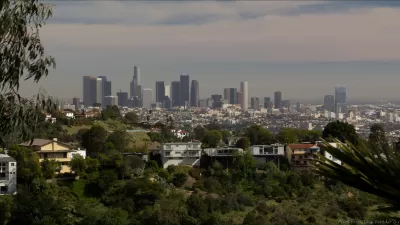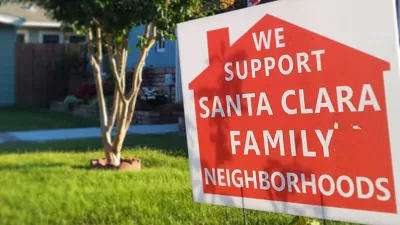Developers are persona no grata in a high-profile City Council election in Los Angeles. Is it a case of NIMBYs gone wild or the empowerment of neighborhood interests?
"Anger over how Los Angeles is permitting development — from vast shopping centers to the McMansion next door — is all but constant on the campaign trail as more than a dozen candidates compete to represent the 4th City Council District, a grab bag of far-flung neighborhoods such as Sherman Oaks, the Hollywood Hills and Hancock Park," according to an article by Emily Alpert Reyes.
The issues may change from neighborhood to neighborhood, but the many remaining candidates in the race have rushed to score points with voters by lambasting development interests. The article provides some details about how each candidate would control developer interests—and the there is no shortage of opinions on how to that among the bunch. One in particular interest to planners: "Many candidates argue that city planning needs a wholesale makeover. Teddy Davis, who once served as an aide to former Mayor Antonio Villaraigosa, suggested the city revise its "outdated" community plans and pursue a "top-to-bottom overhaul of the planning department."
And from the strange but, apparently, true files: "Candidates have also singled out developers as a poisonous political force. Davis declared early in the race that he wouldn't take campaign contributions from developers, and ended up returning a number of contributions he had accepted before making that pledge." One candidate, a businesswoman Sheila Irani, at least acknowledged that she would accept money from "affordable or homeless housing developers."
FULL STORY: Candidates in 4th Council District tap into ire over development

Planetizen Federal Action Tracker
A weekly monitor of how Trump’s orders and actions are impacting planners and planning in America.

Chicago’s Ghost Rails
Just beneath the surface of the modern city lie the remnants of its expansive early 20th-century streetcar system.

San Antonio and Austin are Fusing Into one Massive Megaregion
The region spanning the two central Texas cities is growing fast, posing challenges for local infrastructure and water supplies.

Since Zion's Shuttles Went Electric “The Smog is Gone”
Visitors to Zion National Park can enjoy the canyon via the nation’s first fully electric park shuttle system.

Trump Distributing DOT Safety Funds at 1/10 Rate of Biden
Funds for Safe Streets and other transportation safety and equity programs are being held up by administrative reviews and conflicts with the Trump administration’s priorities.

German Cities Subsidize Taxis for Women Amid Wave of Violence
Free or low-cost taxi rides can help women navigate cities more safely, but critics say the programs don't address the root causes of violence against women.
Urban Design for Planners 1: Software Tools
This six-course series explores essential urban design concepts using open source software and equips planners with the tools they need to participate fully in the urban design process.
Planning for Universal Design
Learn the tools for implementing Universal Design in planning regulations.
planning NEXT
Appalachian Highlands Housing Partners
Mpact (founded as Rail~Volution)
City of Camden Redevelopment Agency
City of Astoria
City of Portland
City of Laramie





























